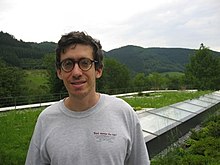Noam Elkies
Noam Elkies | |
|---|---|
 Noam Elkies in 2007 | |
| Born | August 25, 1966 |
| Nationality | American |
| Alma mater | Columbia University, Harvard University |
| Awards | Putnam Fellow |
| Scientific career | |
| Fields | Mathematics |
| Institutions | Harvard University |
| Doctoral advisor | Benedict Gross Barry Mazur |
| Doctoral students | Henry Cohn Nathan Kaplan Abhinav Kumar Sonal Jain David Jao |
Noam David Elkies (born August 25, 1966) is an American mathematician and chess master.
At age 14, Elkies received a gold medal with a perfect score (one of the 26 participants with the score of 42) at the 22nd, 1981 International Mathematical Olympiad,[1] the youngest ever to do so. Elkies graduated from Stuyvesant High School in 1982[2] and went on to Columbia University, where he won the Putnam competition at the age of sixteen years and four months, making him one of the youngest Putnam Fellows in history.[3] He was a Putnam Fellow two more times during his undergraduate years. After graduating as valedictorian at age 18, summa in Mathematics and Music, he earned his Ph.D., at age 20, under supervision of Benedict Gross and Barry Mazur at Harvard University.[4]
In 1987, he proved that an elliptic curve over the rational numbers is supersingular at infinitely many primes. In 1988, he found a counterexample to Euler's sum of powers conjecture for fourth powers.[5]
His work on these and other problems won him recognition and a position as an associate professor at Harvard in 1990.[2] In 1993, he was made a full, tenured professor at the age of 26. This made him the youngest full professor in the history of Harvard, surpassing previous then-youngest professors Alan Dershowitz, William H. Press, and Lawrence Summers (who were each made full professors at age 28).[6]
Elkies, along with A. O. L. Atkin, extended Schoof's algorithm to create the Schoof–Elkies–Atkin algorithm.
He is a composer and solver of chess problems (winning the 1996 World Chess Solving Championship). Elkies is active in musical composition. He has discovered many new patterns in Conway's Game of Life[7] and has studied the mathematics of still life patterns in that cellular automaton rule.[8]
Elkies also studies the connections between mathematics and music. He sits on the Advisory Board of the Journal of Mathematics and Music.[9]
Elkies is also a fellow at Harvard's Lowell House.[10] He is a faculty adviser to the Harvard Israel Review.[11]
References
- ^ Noam Elkies's results at International Mathematical Olympiad
- ^ a b "Noam Elkies c.v." Retrieved 2007-10-31.
- ^ Gallian, Joseph A. "The Putnam Competition from 1938–2006" (PDF). Retrieved 2007-10-31.
- ^ The Mathematics Genealogy Project – Noam Elkies
- ^ "Mathematicians Find New Solutions To An Ancient Puzzle". 2008.
- ^ Ravi Vakil, "The Youngest Tenured Professor in Harvard History," Math Horizons, September 1998, at http://mathdl.maa.org/images/upload_library/22/Evans/september_1998_8.pdf
- ^ Game of Life Status page, Jason Summers.
- ^ Elkies, Noam D. (1998). "Voronoi's Impact on Modern Science, Book I" (Document). Proc. Inst. Math. Nat. Acad. Sci. Ukraine, vol. 21. pp. 228–253.
{{cite document}}: Unknown parameter|arxiv=ignored (help). - ^ "Editorial Board of Mathematics and Music".
- ^ "Lowell House: SCR". Retrieved 2009-07-27. [dead link]
- ^ http://www.hcs.harvard.edu/~hireview/content.php?type=file&name=editors Harvard Israel Review
External links
- Personal site of Noam Elkies at Harvard University
- Noam Elkies at the Mathematics Genealogy Project
- Endgame Explorations – an 11-part series of articles by Noam Elkies in Chess Horizons
- Noam Elkies on LifeWiki
- 1966 births
- Living people
- American mathematicians
- 20th-century mathematicians
- 21st-century mathematicians
- Stuyvesant High School alumni
- Putnam Fellows
- American Jews
- Columbia University alumni
- Harvard University alumni
- Harvard University faculty
- Cellular automatists
- Chess composers
- International solving grandmasters
